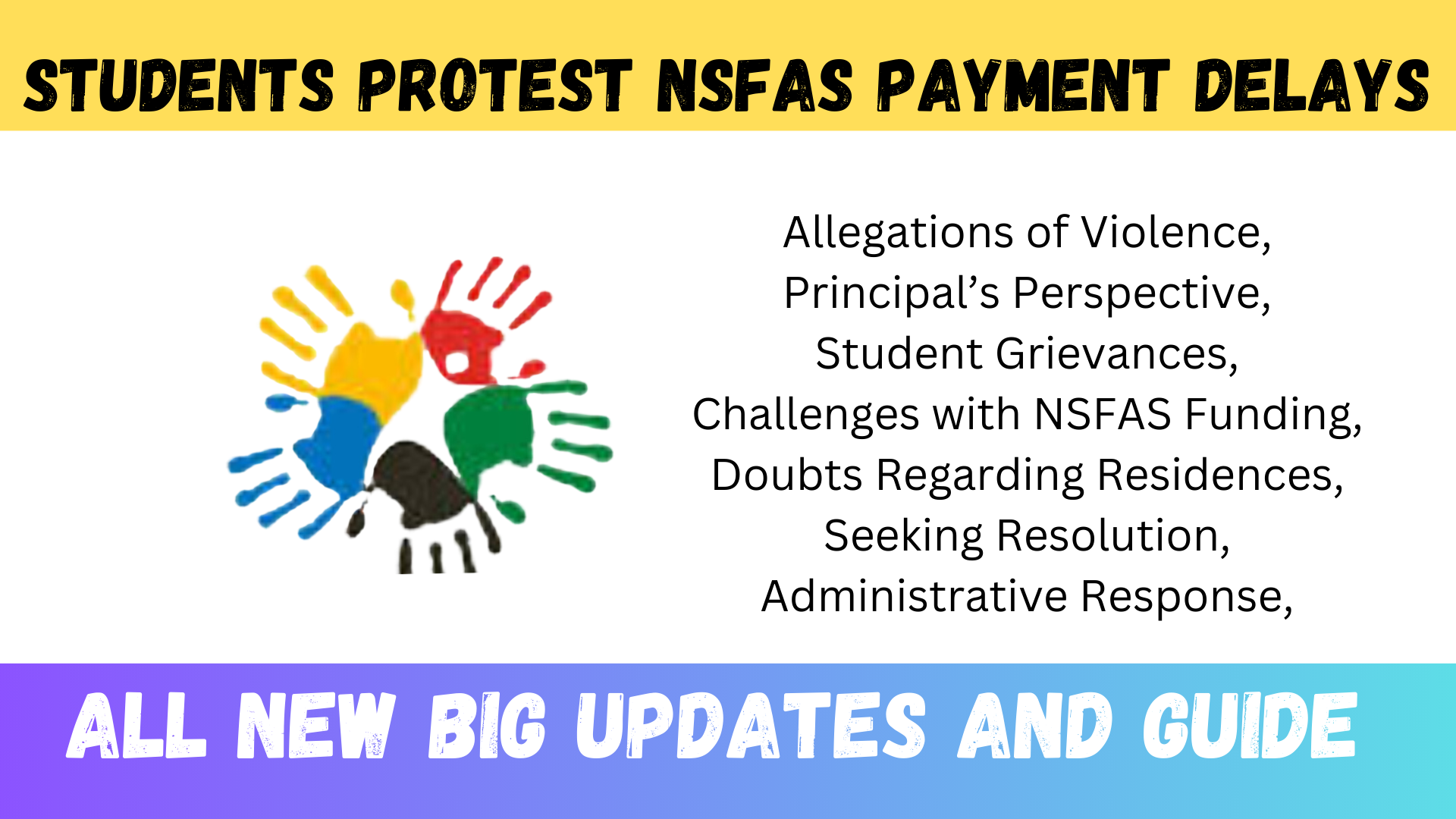Students Protest NSFAS Payment Delays: Student Grievances
Students across South Africa have taken to the streets to voice their frustration over delayed payments from the National Student Financial Aid Scheme (NSFAS). This issue has sparked widespread protests, with allegations of violence surfacing in various regions.
Allegations of Violence
Amid the protests, there have been reports of violent clashes between students and law enforcement officials. Incidents of property damage and injuries have escalated tensions, underscoring the urgency of resolving the underlying issues.
Principal’s Perspective
From the perspective of educational institutions, such as universities and colleges, the unrest poses significant challenges. Principals and administrators are tasked with maintaining campus safety while addressing the legitimate grievances of their students.
Student Grievances
At the heart of the protests are student grievances regarding the timely disbursement of NSFAS funds. Many rely on these funds to cover tuition fees, accommodation costs, and other essential expenses. Delays in payments disrupt their academic pursuits and financial stability.
Challenges with NSFAS Funding
The NSFAS, designed to support financially disadvantaged students, plays a crucial role in enabling access to higher education. However, persistent challenges with funding allocation and administrative processes have hindered its effectiveness, exacerbating frustrations among beneficiaries.
Doubts Regarding Residences
Another point of contention revolves around the availability and adequacy of student residences. Some students express doubts about the transparency of the allocation process and the quality of accommodation provided, further fueling dissatisfaction with the system.
Seeking Resolution
In light of these issues, there is a pressing need for stakeholders to come together and seek viable solutions. Dialogue between student representatives, government officials, educational institutions, and NSFAS administrators is essential to address systemic issues and restore confidence in the system.
Administrative Response
The administrative response to the protests has varied across institutions and government agencies. While some have pledged to expedite the processing of NSFAS payments and improve communication with students, others have faced criticism for their handling of the situation.
As the situation unfolds, it is imperative for all parties involved to prioritize the well-being and academic success of students. Sustainable reforms must be implemented to address the root causes of discontent and ensure equitable access to higher education for all deserving individuals.
This article aims to provide a comprehensive overview of the ongoing protests against NSFAS payment delays, highlighting the underlying issues, perspectives from various stakeholders, and the urgent need for constructive dialogue and action.
Frequently Asked Questions (FAQs) Regarding NSFAS Payment Delays and Student Protests
1. Why are students protesting NSFAS payment delays?
Students are protesting NSFAS payment delays because they rely on these funds to cover essential expenses such as tuition fees, accommodation, and textbooks. Delays in payments disrupt their academic pursuits and financial stability, prompting them to voice their frustrations through protests.
2. What are the main grievances of students regarding NSFAS funding?
The main grievances of students include delayed disbursement of funds, challenges with the application process, inconsistencies in funding allocations, and doubts regarding the transparency and adequacy of student residences provided.
3. How are educational institutions responding to the protests?
Educational institutions are grappling with the protests by prioritizing campus safety, engaging in dialogue with student representatives, and advocating for timely resolution of the underlying issues. Some institutions have also pledged to improve communication with students and expedite the processing of NSFAS payments.
4. What is the role of the NSFAS in higher education access?
The NSFAS plays a crucial role in enabling access to higher education for financially disadvantaged students. It provides funding for tuition fees, accommodation, and other essential expenses, thereby leveling the playing field and ensuring equitable access to education.
How are government agencies addressing the NSFAS payment delays?
- Government agencies are working to address NSFAS payment delays by reviewing administrative processes, allocating additional resources to expedite payments, and enhancing communication channels with beneficiaries. However, the effectiveness of these measures varies, leading to continued frustration among students.
6. What steps can be taken to resolve the NSFAS payment delays and student protests?
To resolve the NSFAS payment delays and student protests, stakeholders must engage in constructive dialogue, address systemic issues with funding allocation and administrative processes, prioritize the well-being and academic success of students, and implement sustainable reforms to restore confidence in the system.
How can students stay informed about updates regarding NSFAS payments and protests?
Students can stay informed about updates regarding NSFAS payments and protests through official communication channels provided by their educational institutions, government agencies, and student organizations. It is essential to verify information from reliable sources to avoid misinformation and confusion.

